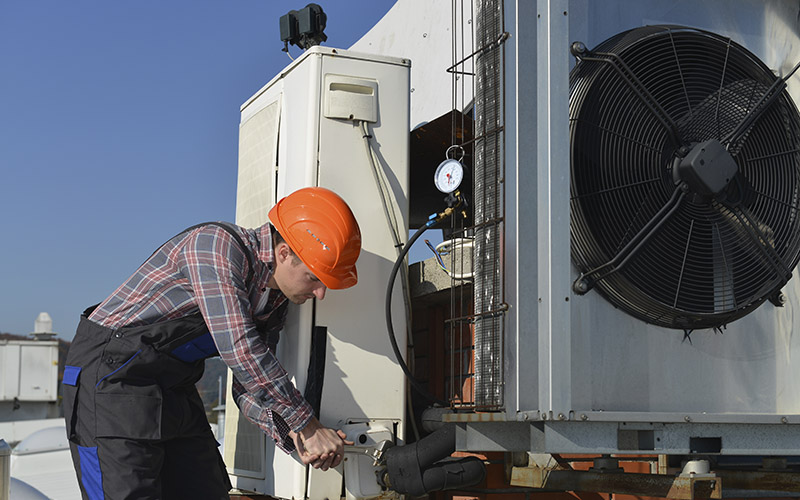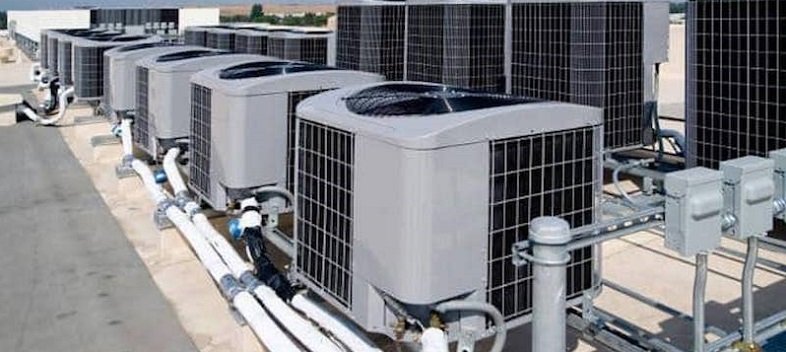Choosing Between a Heatpump and Furnace: Key Considerations for Your Heating And Cooling Needs
When evaluating home heating alternatives for a/c needs, the decision in between a heat pump and a heating system can be complicated. Each system supplies unique benefits tailored to specific environments and power effectiveness goals. Recognizing these distinctions is essential for making an enlightened option. Key variables such as setup costs and ecological effect even more make complex the selection procedure. Which choice truly straightens with one's convenience and sustainability preferences? The adhering to sections will check out these factors to consider carefully.
Recognizing Warm Pumps: Just How They Work and Their Advantages
While numerous home owners think about numerous heating alternatives, understanding just how heatpump function and their benefits can considerably affect their choice. Heat pumps operate by transferring warm as opposed to creating it. In the winter, they remove heat from the outside air or ground and move it indoors, while in the summertime, they reverse this procedure, cooling down the home by getting rid of heat outside. This dual performance makes them functional for year-round climate control.One of the main advantages of warmth pumps is their energy effectiveness. They make use of considerably less electrical energy contrasted to traditional heating systems, possibly leading to reduced utility expenses (heat pump service). Additionally, heatpump have a smaller sized carbon impact, making them an environmentally friendly option. They additionally need much less upkeep than conventional systems, contributing to long-term price financial savings. Overall, understanding the mechanics and advantages of heat pumps can help home owners make notified decisions concerning their heating and cooling down demands
Checking Out Heaters: Kinds, Procedure, and Advantages
Heaters can be found in numerous kinds, including gas, electric, and oil versions, each with unique operational systems. Recognizing these distinctions is essential, as they affect effectiveness and heating efficiency. Furthermore, furnaces offer countless advantages, such as constant heat result and reliability in chillier environments.
Types of Furnaces
Heater can vary significantly in design and procedure, with furnaces being a preferred selection among home owners. There are a number of sorts of heaters, each using different fuel resources and technologies. Gas heating systems are common, leveraging gas to generate heat successfully. Electric heating systems, on the various other hand, use electric resistance to produce heat, usually favored for their uncomplicated setup. Oil heaters, while less usual, work in locations with restricted gas accessibility (furnace replacement). Additionally, condensing heating systems optimize power effectiveness by capturing and reusing exhaust gases. Each kind runs through a system of warmth exchangers and ductwork to distribute cozy air throughout a home. Recognizing the differences in between these furnace kinds is vital for educated heating and cooling choices
Benefits of Heaters
For homeowners looking for reputable heat throughout chilly months, the benefits of heaters are significant. Furnaces give consistent heating, making certain also temperatures throughout the home. They are especially effective in severe cool, usually surpassing warmth pumps in frigid conditions. Different kinds, consisting of gas, electrical, and oil furnaces, provide flexibility to satisfy varied demands and preferences.Furnaces additionally tend to have lower initial setup costs contrasted to heatpump, making them an extra obtainable choice for lots of. Their durable style adds to a much longer life expectancy, with numerous systems lasting over 15 years with appropriate upkeep. Furthermore, contemporary heating systems are commonly furnished with sophisticated innovation for enhanced efficiency, which can cause lowered energy bills. In general, furnaces remain a dependable option for reliable home heating.

Power Efficiency: Comparing Warm Pumps and Furnaces
When contrasting energy performance between heat pumps and heaters, the Seasonal Energy Effectiveness Proportion (SEER) plays an essential function in establishing performance. Additionally, a functional cost analysis exposes the lasting financial implications of each system. Comprehending these variables can direct home owners in making educated choices about their home heating solutions.
Seasonal Power Performance Proportion
Power efficiency plays a crucial role in the decision-making process between warm pumps and furnaces, particularly when taking into consideration the Seasonal Power Efficiency Ratio (SEER) This metric steps the cooling effectiveness of warm pumps over an entire air conditioning period, giving a standard means to assess efficiency. Higher SEER scores indicate better energy performance, converting to reduced energy usage and minimized utility bills. On the other hand, furnaces are usually examined using the Annual Fuel Usage Efficiency (AFUE) score, which shows heating performance. When contrasting these 2 systems, house owners ought to focus on SEER scores for heatpump, as they directly influence general energy savings and ecological sustainability. A comprehensive understanding of SEER can especially influence the long-term contentment and cost-effectiveness of the picked a/c service.
Functional Price Analysis
Understanding the functional expenses related to heatpump and heating systems is important for property owners evaluating their alternatives. Heatpump usually offer greater power effectiveness, transforming electric energy right into warm with marginal waste. This results in lower month-to-month utility costs, specifically in moderate environments. On the other hand, traditional heaters, particularly gas versions, may have reduced upfront expenses but can sustain greater operational expenses over time as a result of fuel costs and efficiency ratings.Moreover, heatpump can function as both heating and cooling down systems, potentially minimizing the demand for separate cooling and heating units. While preliminary financial investments for heatpump might be greater, their long-term cost savings in power performance can make them an extra cost-effective selection for many households. Cautious evaluation of neighborhood power rates is vital to figure out the most effective choice.
Installation Costs: What to Anticipate for every Furnace
Setup costs for furnace can differ considerably between heatpump and heating systems, affecting home owners' choices. Warm pumps normally have greater in advance installment prices, typically ranging from $3,500 to $8,000, depending on the unit size and intricacy of installment. This includes the outdoor unit, interior handling system, and essential ductwork modifications. Conversely, heating systems tend to have lower first prices, averaging in between $2,500 and $6,000, which can be appealing for budget-conscious property owners. Setup expenses can increase if comprehensive ductwork is required.Moreover, the selection of gas type for heaters-- all-natural gas, propane, or electrical-- can also influence setup costs. While heat pumps supply energy efficiency, their first financial investment may deter some buyers. Inevitably, reviewing setup costs along with long-lasting savings and effectiveness will aid house owners in making notified choices about their heating systems.
Climate Considerations: Which System Does Much Better in Your Area
Just how do environment conditions influence the effectiveness of furnace? The performance of heatpump and heating systems can vary substantially depending on the regional climate. In moderate environments, heat pumps excel by successfully transferring warm from the outside air, making them an energy-saving option. Their efficiency reduces in very cold temperatures, where they might battle to extract sufficient warm. Conversely, furnaces, especially gas versions, provide regular and reputable warmth no matter of outside conditions, making them more suitable in chillier regions.In areas that experience milder winter seasons, heatpump can great site run successfully year-round, offering both heating & cooling. On the other hand, areas with severe wintertimes usually profit from the robustness of furnaces. Inevitably, recognizing the neighborhood environment is crucial when deciding between a heatpump and a furnace, as it directly affects their operational efficiency and overall performance.
Maintenance Needs: Long-Term Look After Warmth Pumps vs. Furnaces
While both heatpump and heating systems call for routine upkeep to ensure peak performance, their details requirements and care regimens vary considerably. Furnaces typically need much less frequent focus, with yearly examinations being adequate to check for gas leakages, clean filters, and analyze general functionality. Their simpler layout typically allows for uncomplicated repairs.In comparison, heatpump require semiannual maintenance due to their dual role in heating and air conditioning. This includes cleaning coils, inspecting refrigerant degrees, and guaranteeing that both the exterior and indoor devices work at their finest. In addition, heatpump maintenance typically includes even more intricate elements, making specialist servicing essential.Neglecting upkeep can cause lessened efficiency and boosted power expenses for both systems. Inevitably, property owners must think about these long-term care requirements when selecting between a heatpump and a heater, as proactive maintenance can prolong the life-span and efficiency of either system substantially.
Environmental Impact: Selecting a Sustainable Heating Choice
The ecological influence of heating unit is an important assessment for house owners seeking sustainable choices. Heatpump are typically extra energy-efficient than typical heaters, as they move heat instead of create it, greatly minimizing carbon exhausts. By making use of renewable resource resources, such as geothermal or air-source warmth pumps, property owners can additionally lessen their environmental footprint.On the various other hand, gas heaters produce greenhouse gases and contribute to air contamination, though they usually provide greater warm output. Innovations in innovation have led to the growth of high-efficiency heating systems that reduce emissions.Ultimately, picking a home heating system involves considering efficiency versus ecological effect. Home owners are motivated to reflect on neighborhood power resources and incentives for eco-friendly systems, guaranteeing a selection that lines up with both individual comfort and ecological duty. The choice affects not only immediate convenience but additionally long-lasting sustainability and environmental health.
Frequently Asked Inquiries
The Length Of Time Do Warm Pumps and Furnaces Commonly Last?
The life expectancy of heatpump generally varies from 15 to two decades, while heating systems can last in between 15 to 30 years. Routine upkeep considerably impacts their long life and effectiveness in supplying heating solutions.
Can I Make Use Of a Warm Pump in Incredibly Cold Climates?
Heat pumps can run in extremely cool environments, yet their performance reduces as temperature levels decline. In such conditions, supplementary heating sources may be essential to keep comfy interior temperature levels and ensure peak efficiency.

What Is the Sound Level of Warmth Pumps Versus Furnaces?
The sound levels of heatpump and heating systems differ substantially. Typically, heatpump operate more silently than traditional heaters, making them better for those delicate to sound, while furnaces may create louder operational sounds throughout heating cycles.
Are Warm Pumps Suitable for Both Cooling And Heating?
Heatpump are indeed appropriate for both heating & cooling (heat pump installation ooltewah tn). They operate by transferring warm, giving reliable temperature control year-round, making them a functional choice for house owners seeking an all-in-one cooling and heating service
What Dimension Heating System Do I Required for My Home?
Identifying the proper dimension heating unit for a home needs examining variables such as square video, insulation quality, regional environment, and the home's format. Consulting an expert can assure an accurate assessment and suitable comfort. Warm pumps commonly provide greater power efficiency, converting electric power right into warmth with marginal waste. In modest climates, warm pumps excel by successfully moving heat from the outdoors air, making them an energy-saving alternative. Alternatively, heating systems, specifically gas versions, provide consistent and dependable warmth no matter of exterior conditions, making them better in chillier regions.In areas that experience milder winter seasons, heat pumps can operate efficiently year-round, supplying both home heating and air conditioning. Warmth pumps are usually more energy-efficient than conventional heating systems, as they move warmth instead than produce it, considerably check out here lowering carbon exhausts. By view publisher site using sustainable energy sources, such as air-source or geothermal warmth pumps, home owners can better lessen their ecological footprint.On the other hand, all-natural gas heating systems release greenhouse gases and contribute to air pollution, though they typically offer greater warm outcome.
Comments on “Monthly Action Plan for Effective heat pump service”